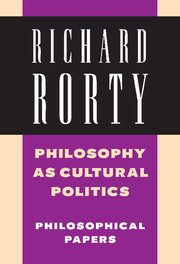Book contents
- Frontmatter
- Contents
- Preface
- Acknowledgments
- I RELIGION AND MORALITY FROM A PRAGMATIST POINT OF VIEW
- 1 Cultural politics and the question of the existence of God
- 2 Pragmatism as romantic polytheism
- 3 Justice as a larger loyalty
- 4 Honest mistakes
- II PHILOSOPHY'S PLACE IN CULTURE
- III CURRENT ISSUS WITHIN ANALYTIC PHILOSOPHY
- Index of names
4 - Honest mistakes
Published online by Cambridge University Press: 05 June 2012
- Frontmatter
- Contents
- Preface
- Acknowledgments
- I RELIGION AND MORALITY FROM A PRAGMATIST POINT OF VIEW
- 1 Cultural politics and the question of the existence of God
- 2 Pragmatism as romantic polytheism
- 3 Justice as a larger loyalty
- 4 Honest mistakes
- II PHILOSOPHY'S PLACE IN CULTURE
- III CURRENT ISSUS WITHIN ANALYTIC PHILOSOPHY
- Index of names
Summary
People do not call themselves, without irony, cold war liberals. The term was designed to be pejorative. Like “parlor pink” and “Gucci Marxist,” it is intended to describe a particular kind of hypocrite – in this case, a person who supported the cold war and nevertheless continued to call herself a “liberal,” a description to which she must have known perfectly well she was no longer entitled. To describe someone as a cold war liberal is to suggest that he or she sold out. Why, after all, would they have supported a reactionary enterprise if not to further, or safeguard, their careers?
The most conspicuous and influential cold war liberals were ex-Stalinists, or ex-Trotskyists, or ex-fellow-travelers who had experienced the bitter factionalism that pervaded leftist politics in the 1930s. That factionalism was caused by uncertainty about whether the Soviet Union had been hijacked by a blood-soaked tyrant or still embodied the hope for social justice. The bitterness of disagreements over this question carried over into the 1940s and 1950s, with Wallace versus Truman and Hiss versus Chambers taking the place of Stalin versus Trotsky. So did the indiscriminate use of words like “dupe,” “sellout,” “turncoat,” and “renegade.”
For most of the fifty years between 1939 and 1989, these two leftist camps exchanged charges of dishonesty. In both, it was agreed that no decent person who had sufficient intelligence to grasp the issues and weigh the evidence could remain in the other.
- Type
- Chapter
- Information
- Philosophy as Cultural PoliticsPhilosophical Papers, pp. 56 - 70Publisher: Cambridge University PressPrint publication year: 2007
- 3
- Cited by



